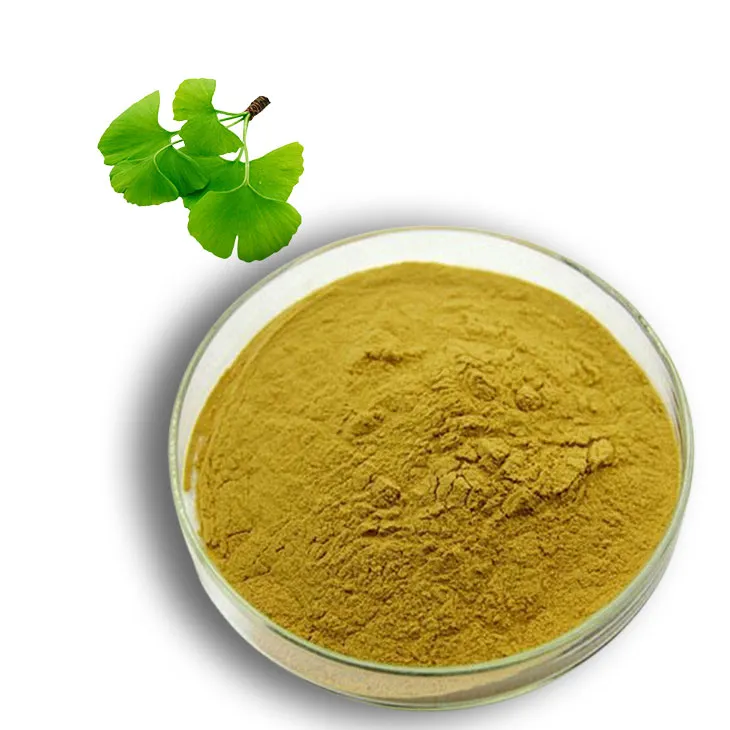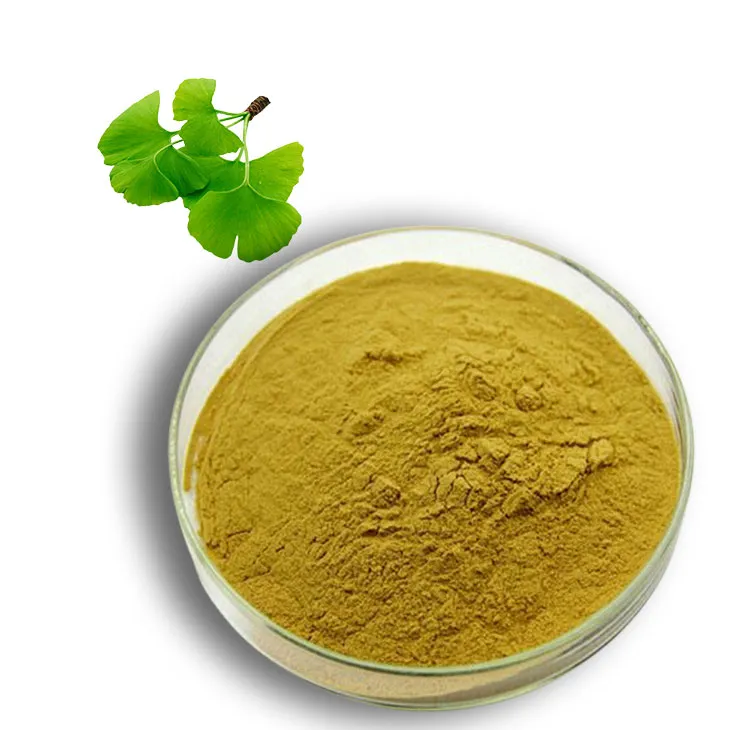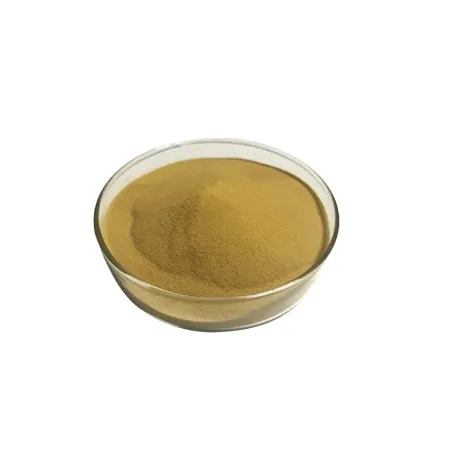- 0086-571-85302990
- sales@greenskybio.com
Ginkgo biloba extract: Benefits, uses and possible side effects.
2024-11-12

I. Introduction
Ginkgo biloba is one of the oldest living tree species, and its extract has been used in traditional medicine for centuries. In modern times, scientific research has been carried out to explore the potential benefits, uses, and possible side effects of Ginkgo biloba extract. This extract contains a variety of bioactive compounds, such as flavonoids and terpenoids, which are believed to be responsible for its pharmacological effects.

II. Benefits
1. Cognitive function improvement
One of the most well - known benefits of Ginkgo biloba extract is its potential to improve cognitive function. Flavonoids and terpenoids in the extract may enhance blood flow to the brain, which can be beneficial for memory, attention, and concentration. Some studies have suggested that it may be helpful for people with age - related cognitive decline, such as mild cognitive impairment or early - stage Alzheimer's disease. For example, in a long - term study, participants who took Ginkgo biloba extract showed a slower rate of cognitive decline compared to those who took a placebo.
2. Antioxidant properties
Ginkgo biloba extract has strong antioxidant properties. Antioxidants play a crucial role in protecting the body's cells from damage caused by free radicals. Free radicals are unstable molecules that can cause oxidative stress, which is linked to various diseases, including cancer, heart disease, and neurodegenerative disorders. The flavonoids in the Ginkgo biloba extract can scavenge free radicals, reducing oxidative stress in the body. This antioxidant effect may also contribute to its potential benefits for skin health, as it can help prevent premature aging of the skin caused by environmental factors such as UV radiation.
3. Circulation improvement
By dilating blood vessels, Ginkgo biloba extract can improve blood circulation. This is beneficial for the entire cardiovascular system. Improved circulation can help reduce the risk of blood clots, which can lead to heart attacks and strokes. It may also be helpful for people with peripheral vascular disease, as it can increase blood flow to the extremities, relieving symptoms such as cold hands and feet. In addition, better circulation can enhance the delivery of oxygen and nutrients to all parts of the body, promoting overall health.
4. Anti - inflammatory effects
Chronic inflammation is associated with many health problems, such as arthritis, diabetes, and certain cancers. Ginkgo biloba extract has been shown to have anti - inflammatory effects. The bioactive compounds in the extract can modulate the body's immune response and reduce the production of inflammatory mediators. This may help in alleviating the symptoms of inflammatory diseases and potentially preventing the progression of these diseases. For example, in some animal studies, Ginkgo biloba extract has been found to reduce joint inflammation in models of arthritis.

III. Uses
1. In traditional medicine
In traditional Chinese medicine, Ginkgo biloba has been used for a variety of purposes. It has been used to treat respiratory problems, such as coughs and asthma. The leaves were often prepared as a decoction or tincture for internal use. Additionally, it was believed to have tonic effects on the body, enhancing vitality and well - being. In some traditional European medicine practices, Ginkgo biloba was also used for similar purposes, especially for improving circulation and relieving symptoms related to poor blood flow.
2. In modern healthcare
- Memory enhancement: Ginkgo biloba extract is often used as a dietary supplement to support memory and cognitive function. It may be recommended for students during exam periods or for older adults who want to maintain their mental sharpness.
- Cardiovascular health: Due to its ability to improve circulation and prevent blood clots, it may be used as an adjunct therapy for people with heart disease or at high risk of cardiovascular problems. For example, some doctors may suggest it for patients with hypertension or high cholesterol levels in combination with other medications.
- Eye health: There is some evidence that Ginkgo biloba extract may be beneficial for eye health. It may help in treating certain eye conditions, such as macular degeneration, by improving blood flow to the eyes. However, more research is needed to confirm these effects.
- Tinnitus treatment: Tinnitus is a condition characterized by a ringing or buzzing sound in the ears. Some studies have explored the use of Ginkgo biloba extract in treating tinnitus. Although the results are not conclusive, it may offer some relief for some patients.

IV. Possible side - effects
1. Gastrointestinal issues
Some people may experience gastrointestinal side - effects when taking Ginkgo biloba extract. These can include nausea, vomiting, diarrhea, or abdominal pain. These side - effects are usually mild and may occur more frequently at higher doses. It is important to start with a low dose and gradually increase it if necessary to minimize these gastrointestinal problems.
2. Bleeding risk
Ginkgo biloba extract has blood - thinning properties, which can increase the risk of bleeding. This is especially a concern for people who are already taking anticoagulant medications, such as warfarin or aspirin. Combining Ginkgo biloba extract with these medications can further increase the risk of bleeding, which may lead to serious consequences such as excessive bleeding from a minor injury or internal bleeding. Therefore, it is crucial to consult a healthcare provider before using Ginkgo biloba extract if you are on anticoagulant therapy.
3. Allergic reactions
Although rare, allergic reactions to Ginkgo biloba extract can occur. Symptoms may include skin rashes, itching, swelling, or difficulty breathing. If any of these symptoms occur after taking the extract, it is important to stop using it immediately and seek medical attention. People with known allergies to plants in the Ginkgoaceae family should avoid using Ginkgo biloba extract.
4. Interaction with other medications
In addition to anticoagulant medications, Ginkgo biloba extract may interact with other drugs. For example, it may interact with some antidepressant medications, affecting their efficacy or increasing the risk of side - effects. It can also interact with anti - seizure medications, potentially reducing their effectiveness. Therefore, it is essential to inform your healthcare provider about all the medications you are taking before starting Ginkgo biloba extract.

V. Conclusion
Ginkgo biloba extract has a wide range of potential benefits, including improving cognitive function, providing antioxidant protection, enhancing circulation, and having anti - inflammatory effects. It has been used in traditional medicine and also has various applications in modern healthcare. However, it is not without possible side - effects, such as gastrointestinal issues, bleeding risk, allergic reactions, and interactions with other medications. Before using Ginkgo biloba extract, it is advisable to consult a healthcare professional, especially if you have pre - existing medical conditions or are taking other medications. This will ensure that you can safely and effectively take advantage of the potential benefits of this ancient plant extract.
FAQ:
What are the main benefits of Ginkgo biloba extract?
Ginkgo biloba extract has several potential benefits. It may help improve blood circulation, which can be beneficial for cognitive function as it ensures better oxygen and nutrient supply to the brain. It may also have antioxidant properties, which can protect cells from damage caused by free radicals. Additionally, some studies suggest it might be helpful in alleviating symptoms related to age - related macular degeneration, tinnitus, and some forms of dementia.
How can Ginkgo biloba extract be used?
Ginkgo biloba extract is available in various forms such as capsules, tablets, and liquid extracts. It is often used as a dietary supplement. For example, those who hope to potentially improve their cognitive abilities may take it according to the recommended dosage. However, it should not be used as a substitute for medical treatment without consulting a healthcare provider. It is important to follow the instructions on the product label regarding dosage and usage.
Are there any possible side - effects of Ginkgo biloba extract?
Yes, there are possible side - effects. Some people may experience mild side - effects like headache, dizziness, stomach upset, or allergic reactions. In more rare cases, it may cause bleeding problems, especially when combined with blood - thinning medications. Therefore, it is crucial to inform your doctor if you are taking Ginkgo biloba extract, especially if you are on other medications or have underlying health conditions.
Can Ginkgo biloba extract really improve cognitive function?
While some studies suggest that Ginkgo biloba extract may have a positive impact on cognitive function, the evidence is not conclusive. Some research has shown improvements in memory, attention, and other cognitive aspects in certain populations, such as the elderly. However, more research is needed to fully understand its effectiveness and to determine the optimal dosage and duration of use for cognitive enhancement.
Is it safe to take Ginkgo biloba extract for a long time?
The long - term safety of Ginkgo biloba extract is not yet fully established. Although short - term use at recommended dosages generally seems to be well - tolerated by most people, long - term use may carry some risks, especially regarding potential interactions with other medications and the development of unforeseen side - effects. It is advisable to consult a healthcare professional before long - term use.
Related literature
- The Effects of Ginkgo biloba Extract on Cognitive Function: A Meta - analysis"
- "Ginkgo biloba Extract: Pharmacological and Clinical Applications"
- "Safety and Efficacy of Ginkgo biloba Extract in Neurological Disorders"
- ▶ Hesperidin
- ▶ Citrus Bioflavonoids
- ▶ Plant Extract
- ▶ lycopene
- ▶ Diosmin
- ▶ Grape seed extract
- ▶ Sea buckthorn Juice Powder
- ▶ Fruit Juice Powder
- ▶ Hops Extract
- ▶ Artichoke Extract
- ▶ Mushroom extract
- ▶ Astaxanthin
- ▶ Green Tea Extract
- ▶ Curcumin
- ▶ Horse Chestnut Extract
- ▶ Other Product
- ▶ Boswellia Serrata Extract
- ▶ Resveratrol
- ▶ Marigold Extract
- ▶ Grape Leaf Extract
- ▶ New Product
- ▶ Aminolevulinic acid
- ▶ Cranberry Extract
- ▶ Red Yeast Rice
- ▶ Red Wine Extract
-
Senna Leaf Extract
2024-11-12
-
Polygonum Cuspidatum Extract
2024-11-12
-
Maitake Mushroom Extract
2024-11-12
-
Tongkat Ali Extract
2024-11-12
-
Propolis Extract Powder
2024-11-12
-
Hedyotis Diffusa Extract
2024-11-12
-
Dandelion Leaf Extract
2024-11-12
-
Quercetin
2024-11-12
-
Baicalin
2024-11-12
-
Curcumin Extract
2024-11-12





















